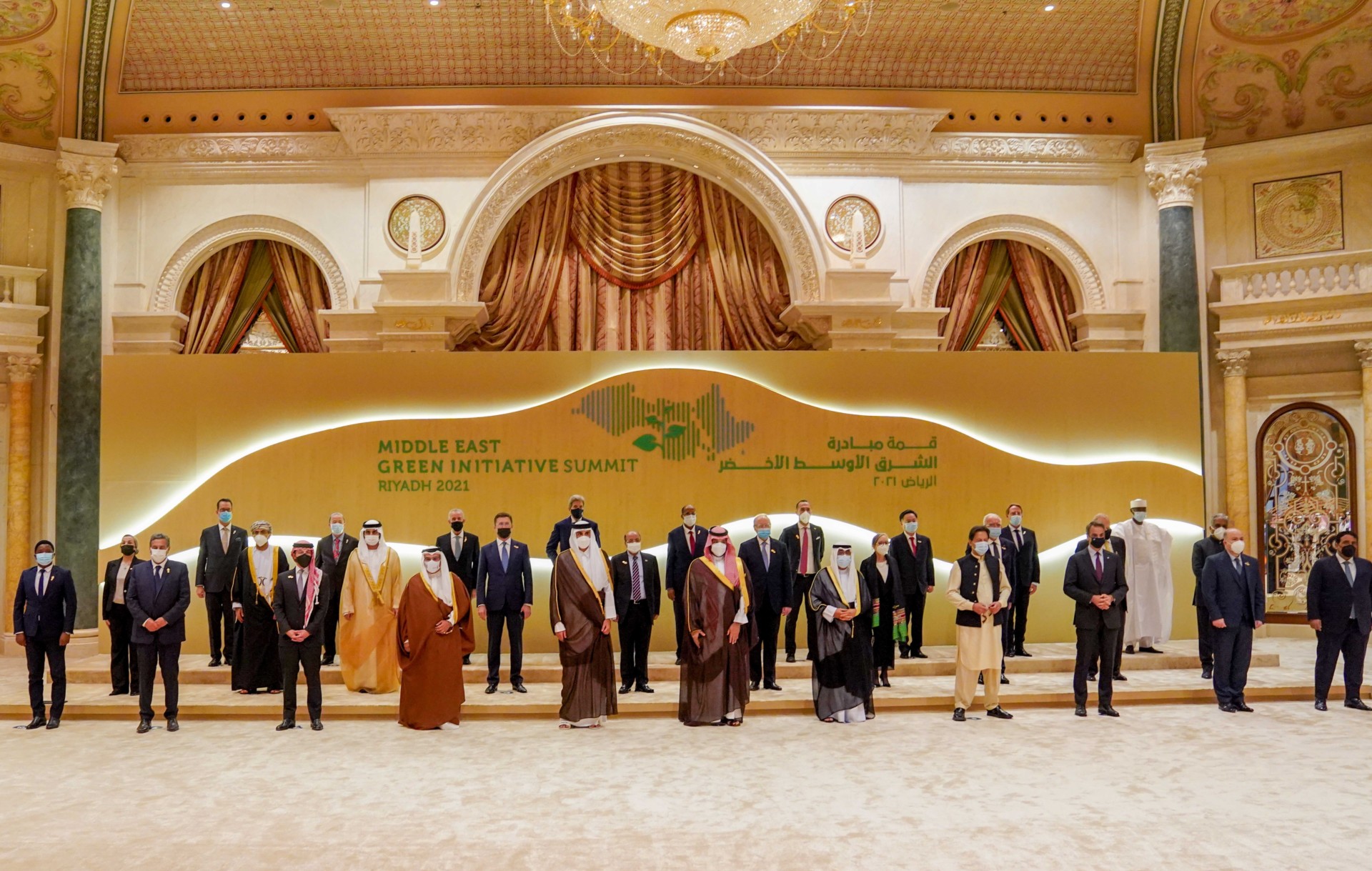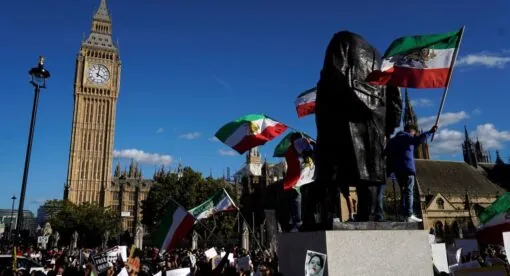The Middle East and North Africa are particularly vulnerable to the effects of global warming, which will exacerbate the already high levels of instability in the region.
Climate change is the single most pressing global challenge that humanity presently faces, and one that will ultimately determine its survival. The Middle East and North Africa (MENA), in particular, are likely to be the most dramatically and negatively impacted by climate change, which could in turn exacerbate existing security issues there. This is an urgent challenge that requires a concerted effort to address.
Water Challenges
A recent U.N. report names the MENA region a climate change hotspot, with climate models predicting temperatures 20% higher than global averages. In the Middle East, temperatures have increased by 1.5°C (about 2.7°F) over the past 100 years — a 50% increase over the global average. Last summer saw the most days of temperatures above 50°C (122°F) since recordkeeping began. The region is already one of the driest — it is the most water-scarce in the world — and the increasing temperatures are predicted to lead to more persistent and acute drought, accompanied in many places by wildfires. These fires are exacerbated by heatwaves, leading them to intensify and occur with greater frequency.
More than 60% of the population in the region has very little if any access to potable water, and 70% of their GDP is vulnerable to water stress; scientists predict these stresses will affect Iraq, Lebanon, Jordan, Morocco, and Syria in particular. As 70% of MENA’s agricultural production is rain-fed, this renders the region extremely vulnerable to changes in temperature and rainfall resulting from climate change. The World Economic Forum has highlighted water scarcity as “the greatest threat to the region — greater even than political instability or unemployment.” In a region that suffers from a severe democratic deficit and loose loyalty to central governments, an inability to protect the population from the wrath of nature could lead to further social and political instability.
At the same time, coastal areas in MENA face increasing climate change-related rises in sea level increasing the likelihood of flooding, one of the most recurrent forms of natural disaster in the region. The growing urban population in coastal cities makes this a significant area of risk, one that is also affecting places such as the Nile Delta in Egypt — home to 41% of its population and the lifeblood of the country.
Thus, water challenges intensified by climate change are likely to negatively impact both habitability and crop yields in the region, with the latter increasing food scarcity and dependence on imports of basic food. Heavier reliance on food imports, which is already occurring, leaves the region’s food systems prone to price fluctuation in global markets and could result in a rise in the cost of food for the region’s populations.
Population Growth
Compounding the issues of water and food scarcity is MENA’s population explosion; the region is experiencing the fastest growth in the world, much of which is focused in urban centers. It is estimated that by 2050 the region’s population will have doubled to 724 million. Climate change has particularly contributed to increasing the vulnerabilities of youth, exposing them to violence, exploitation, and abuse, according to a report by UNICEF. This type of population growth, paired with the effects of climate change, will likely heighten competition over already scarce resources, potentially leading to political and social unrest and violence.
While on its own climate change may not be the trigger of conflict, it is liable to act as a multiplier. In Syria, one of the catalysts for the ongoing civil war was the droughts from 2006 to 2011, which displaced rural populations and deepened the socioeconomic divide between urban and rural Syrians. While it can’t be pointed to as the main cause behind the Egyptian revolution, the 2008 food crisis and resulting increase in food prices are likely to have magnified the civil unrest and eruption of conflict. And in Yemen, the prolonged conflict appeared to intensify in response to the water crisis.
Factors such as weak governance, political instability, urbanization, lack of access to water and food, and a deepening socioeconomic divide contribute to unrest and conflict, but as these vulnerabilities are amplified by climate risks, they provide added incentives for migration. The MENA region has already experienced both internal displacement and waves of refugees due to civil conflict, as well as the escalation of sectarian violence and terrorism, and it is likely to be harshly impacted by climate migration.
Most countries in the region do not have the economic resources, institutions, infrastructure, or technology necessary to reduce the climate risks or safeguard their populations. The GCC countries and Israel are among the few with the financial resources and technological expertise needed to address many of the climate risks, leaving the rest of the region extremely exposed. Some recent efforts have begun bridging this divide, however; for example, the 2020 Abraham Accords accelerated cooperation between Israel and GCC countries, as well as technology sharing around bringing clean water to the UAE and other countries in the region.
Global Impact
It is unlikely that the U.S. will bear the brunt of MENA climate refugees, yet it is probable that it will feel the effects of climate migration in a variety of other ways such as waves of migration to countries of keen strategic importance to U.S. interests. As the effects of climate change compound pre-existing political and social unrest, populations fleeing conflict and climate change-related disasters will lead to more internally displaced people (IDPs) and climate refugees crossing neighboring borders. If these refugees remain in MENA, it will place more pressure on countries already under great strain from previous waves of refugees, such as Lebanon and Jordan, where refugees make up more than 25% of their populations. Similar to previous crises, refugees are likely to also flee further afield to Turkey, Greece, Italy, and other European countries.
A key concern in this respect for the U.S. will be the negative impact on its NATO allies, especially Turkey, which is unlikely to be able to withstand another large influx of refugees. Such pressures could destabilize its government and institutions, but they also might be used by Ankara as leverage against other European countries to extract money from them.
Many of those who suffer from poverty, fleeing climate risks, will likely remain internally displaced as they will not be able to afford to seek refuge elsewhere. Both these IDPs and refugees facing a lack of economic opportunities and social networks, especially among young single men, may be more easily influenced to extremism, which could spill over to the U.S. and its allies. This environment of uncertainty may also allow for the emergence of more authoritarian regimes in the region, as they struggle to control populations and evolving crises. Such a move would harm U.S. efforts to democratize the region and could lead to migration to surrounding countries and beyond, which could increasingly lead to political and social unrest and civil wars in the region, compromising U.S. geo-strategic and economic interests.
The risks posed to U.S. national security by climate change have been highlighted by U.S. policymakers such as Director of National Intelligence Avril Haines, who declared it a “threat multiplier” that needed to be at the center of U.S. foreign policy and national security, as well as in the executive order on tackling climate change at home and abroad. They acknowledge the knock- on effect climate change will have on fragile states competing over scarce resources in creating the ideal conditions for “malign actors to thrive.”
Yet thus far, little has been done to address this looming threat. There are many ways in which the U.S. could diplomatically, financially, scientifically, educationally, and technologically support the MENA region in mitigating and minimizing the risks presented by climate change. As a technological powerhouse with ties to many governments in the region, the U.S. is well positioned to play both a role in the political process and in accelerating the use of green technologies in the region.
Recommendations
To adequately develop capacity and solutions to climate-related population displacement, MENA governments should move towards greater regional cooperation needed to develop policies to tackle climate change’s domestic, regional, and global challenges, including climate migration. In light of political differences and areas of mutual distrust, it is an imperative to isolate specific areas related to climate change from other contentious issues to enable progress on regional efforts to address climate change. This will have the added value of building confidence among parties that could also benefit other areas of disagreement.
In order to do this, the region should develop a cooperation mechanism, the MENA Environmental Agency, with the twin goals of meeting the criteria set by the 2015 Paris Climate Agreement and developing strategies to respond to population displacements as they take place. This agency should set up an advisory board that includes representatives from the relevant scientific and business communities and from civil society organizations from across the region. Its mission would be to coordinate tackling climate change between governments and the private sector to develop and deploy technology solutions to slow climate change and achieve net zero greenhouse gas emissions by 2050.
MENA governments should create a fund, through the Arab League in cooperation with the World Bank Group’s Climate Change Action Plan, to support:
- Efforts to combat water shortages and greenhouse gas emissions through desalination and solar power (MENA accounts for 48% of global desalination projects, and according to some estimates, investment in this industry is expected to reach $4.3 billion within the next two years)
- Advanced irrigation systems, especially computer-controlled drip irrigation that could increase food production with less water
- Rural and urban planning to face the growing threat of the consequences of climate change, including providing support for those hit by floods and droughts and assisting those who are forced to move to towns and cities as result of climate change
- The establishment of region-wide programs of entrepreneurship in green energy and recycling waste
- Setting rigorous climate-change educational curricula and public awareness programs on changing consumption habits
Yossi Mekelberg is an associate fellow with the Middle East and North Africa Programme at Chatham House. Mekelberg is currently an adjunct professor at Webster University in Tashkent Uzbekistan. His fields of expertise include the politics of the Middle East, Israeli politics, the Middle East peace process, international relations theory and US foreign policy towards the MENA region. Yossi is also currently a weekly columnist for Arab News and serves as a member of the Human Rights Watch London Committee. He tweets at @YMeckelberg.
Kate Fanning works for Greenpeace UK, and Regent’s University. Fanning’s areas of expertise include human rights, civil society, and international relations. In addition to teaching she has also consulted for various NGOs on outreach, and organizational and strategic challenges, co-founded the Youth Model United Nations conference at Regent’s University.
The views expressed in this article are those of the author and not an official policy or position of the New Lines Institute.







